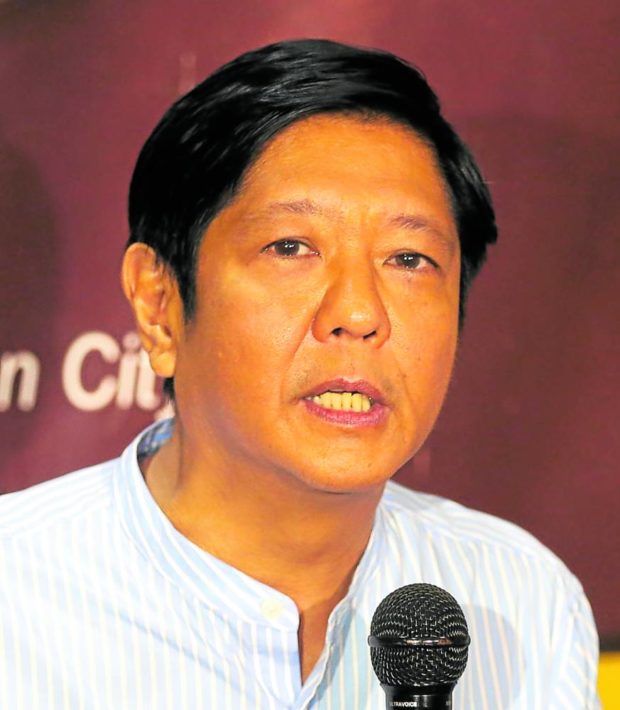
Former Sen. Ferdinand “Bongbong” Marcos Jr. INQUIRER FILE PHOTO
MANILA, Philippines — The disqualification of former Sen. Ferdinand “Bongbong” Marcos Jr. from next year’s presidential election may be raised at any time as he was convicted of a crime that prohibits him from being elected or appointed to any government position, according to former Supreme Court Senior Associate Justice Antonio Carpio.
Marcos was convicted of tax evasion, an offense under the National Internal Revenue Code (NIRC), which carries the penalty of perpetual disqualification from public office, Carpio said on Saturday.
The decision of the Quezon City Regional Trial Court in 1995 was upheld by the Court of Appeals (CA) in 1997. It became final in 2001 after Marcos withdrew his Supreme Court appeal.
Since his conviction, Marcos has been elected as governor and representative of Ilocos Norte, and senator. He was defeated in the vice presidential election in 2016. His conviction and disqualification were not raised by his opponents.
“It’s immaterial that it was not raised before,” Carpio said in response to statements by the Marcos camp that belittled a petition with the Commission on Elections (Comelec) to cancel his certificate of candidacy (COC) because the conviction was not for a crime that involved moral turpitude.
‘Glossing over’
Carpio said Marcos and his lawyers were “glossing over” the disqualification provision in the NIRC by focusing on moral turpitude as a ground for canceling the COC of a candidate under the Omnibus Election Code.
This attempt, he added, was expected since that ground could be “subject to interpretation.”
“But they fail to realize that the CA decision also ordered Marcos to pay ‘deficiency income tax due with interest’ apart from the fine,” he said. “Since Marcos was also ordered to pay deficiency income taxes due, there was tax evasion, which inherently involves moral turpitude.”
The CA ruling saved the son and namesake of dictator Ferdinand Marcos from serving time in prison. It only imposed fines on Marcos for his failure to pay taxes and submit his income tax returns from 1982 to 1985 when he was vice governor and later governor of Ilocos Norte.
Two civil society groups and martial law victims represented by lawyer Howard Calleja on Friday said the appeals court’s decision should be declared void ab initio (from the start) for removing the prison term imposed by the Quezon City court on Marcos.
No escaping issue
Carpio, however, said voiding the CA ruling was “arguable.”
“But there is no need to raise that because even as is, the CA decision already disqualifies Marcos,” he told the Inquirer. “Marcos cannot escape (the issue of) moral turpitude under the CA decision.”
Under the NIRC, or Republic Act No. 8424, persons found guilty of tax evasion should pay the unpaid taxes and fines, and suffer imprisonment.
Section 253 (c) of the law also explicitly states that if the convicted individual is a public official “the maximum penalty prescribed for the offense shall be imposed and, in addition, he shall be dismissed from the public service and perpetually disqualified from holding any public office, to vote and to participate in any election.”
Carpio said this provision alone was enough to bar Marcos from vying for the country’s highest elective office.
Meeting with JPE
On Saturday, Marcos met with former Senate President Juan Ponce Enrile and his daughter, Katrina, who forged an alliance with the Partido Federal Pilipinas (PFP), the party under which he filed his COC for president.
The 97-year-old former defense minister who broke with Marcos during the 1986 Edsa People Power Revolution that toppled the dictator, announced his family’s support for Marcos and in turn secured the endorsement of the PFP for his daughter’s candidacy as first district representative of Cagayan province.Katrina is a member of the Lakas-CMD party.